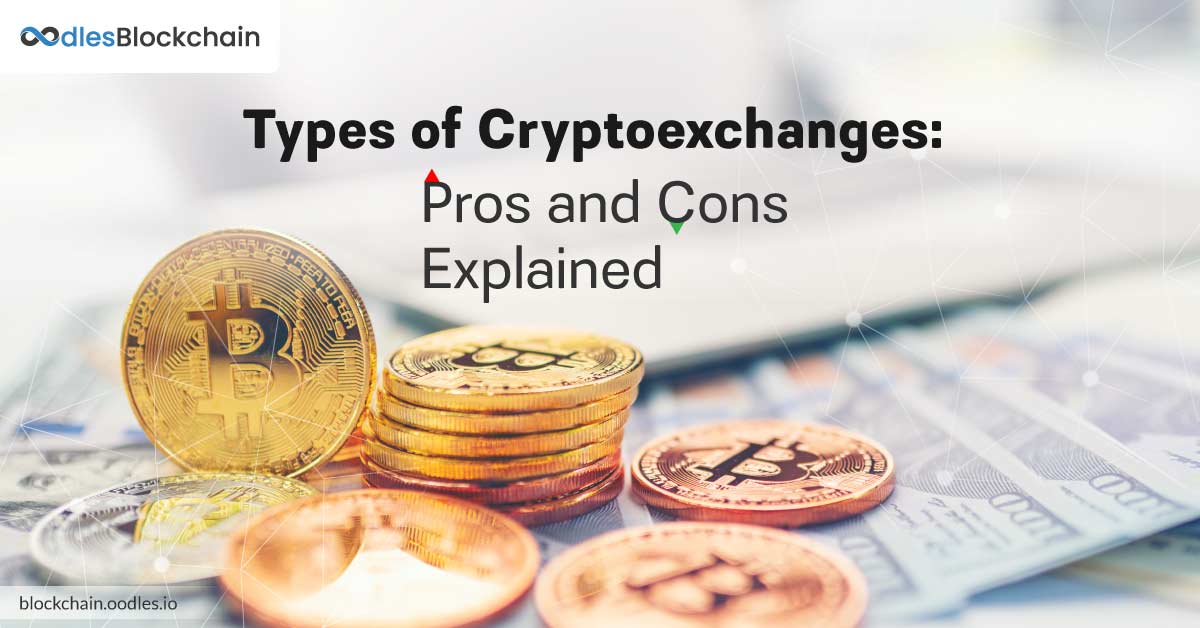People around the world are investing billions of dollars in cryptocurrency every year. It can be said that the market capitalization of digital currencies is only bound to increase in the future. That leads to the question – how does one trade cryptocurrencies?
The answer is simple, anyone looking to trade in cryptocurrencies needs to sign up with a crypto exchange. A crypto exchange is a platform where users trade cryptocurrencies for other assets, such as fiat money or other digital currencies.
Currently, there are three types of exchanges: Centralized exchange (CEXs), a decentralized exchange (DEXs), and a new innovative platform, Hybrid exchange.
Each exchange comes with its unique business model and features that might or might not serve your business requirements. So which exchange fulfills your needs? Although there is no definite winner in the race, a trader can analyze the advantages and disadvantages of these exchanges to make a more informed decision.
So, let’s learn about different kinds of exchanges functioning in the crypto market today:
Table of Contents
Advantages and Disadvantages of CEXs
Today, most people around the world trade digital currencies on a centralized exchange because they appreciate its simple interface.
The technology behind the model is easy to understand; the exchange’s ledger updates its internal database regarding who owns what at different points in time. The third-party in control of the server possesses all exchange data, transaction history, and funds of customers. Therefore, a centralized exchange platform enables high liquidity, fast transactions, and streamlined user experience on the exchange. The speed and simplicity of a CEXs have led to a majority of traders adopting the platform over a decentralized exchange. The higher user base, in turn, has resulted in a much higher trading volume as well.
However, the problem with a central server model also resides in its simplicity. The central, third party server that holds KYC data of every user, becomes a single point of failure. For instance, if a hacker manages to corrupt the central server, he’ll come to possess the data of every user on the system. The obvious drawbacks in security and privacy are quite real; there have been hacks in the past that have caused substantial losses.
Pros and Cons of DEXs
Those looking for a trustless and discrete experience prefer a decentralized exchange. A decentralized exchange does not have a central server. It does not hold the data of all its customers, which permits its users to have more control over their data. Every transaction on the network happens in a peer-to-peer manner, thus, eliminating the intermediary. It results in lower service charges than centralized exchanges. Moreover, it is a much safer alternative to traditional centralized exchanges as there is no single point of failure. To hack the network, a hacker must compromise the entire digital ledger to gain access to customer data. A decentralized exchange is much more secure and reliable than a centralized exchange.
Even though it is a much safer alternative, many users still prefer centralized exchanges, due to their easy accessibility. A beginner struggles to understand the complicated format of a DEX whereas an expert finds the lack of analytical tools frustrating. Above all, DEXs are slower than CEXs. Furthermore, DEXs don’t have as many trading pairs as CEXs. That means users incur extra costs of converting one crypto coin to another before they can trade them on a DEX. All these problems have led to lower user adoption, and consequently, a much lower trading volume compared to centralized exchanges.
Pros and Cons of a Hybrid Exchange
Hybrid exchanges are a new type of crypto exchange; they intend to combine the best features of centralized and decentralized exchanges. A hybrid exchange is not only secure and reliable but it also provides analytical tools to experts and aficionados.
Due to its “hybrid” nature, a user enjoys the features of a CEX and a much more secure environment provided by DEXs.
Businesses stand to gain a lot from this innovative method of trading cryptocurrencies and assets. However, it is not well tested and developers need more time to streamline the experience for their clients. If you’re ready to invest in this type of exchange, make sure you’re patient, because the potential benefits outweigh the negatives.
The idea is new but holds immense potential if the developer can come up with customized solutions for your business.
Conclusion
As explained, each option has its pros and cons. It’s ultimately up to the client to determine what works best for them. To make an informed decision, one should first ascertain what is the primary concerns of potential customers? Security, speed or privacy? We, at Oodles, can help you with this complicated decision and guide your business to success.
Author Bio
We are a blockchain development company that also has expertise in providing cryptocurrency exchange development services. Contact us now for hassle-free exchange development solutions and start your cryptocurrency exchange business today.

About the author